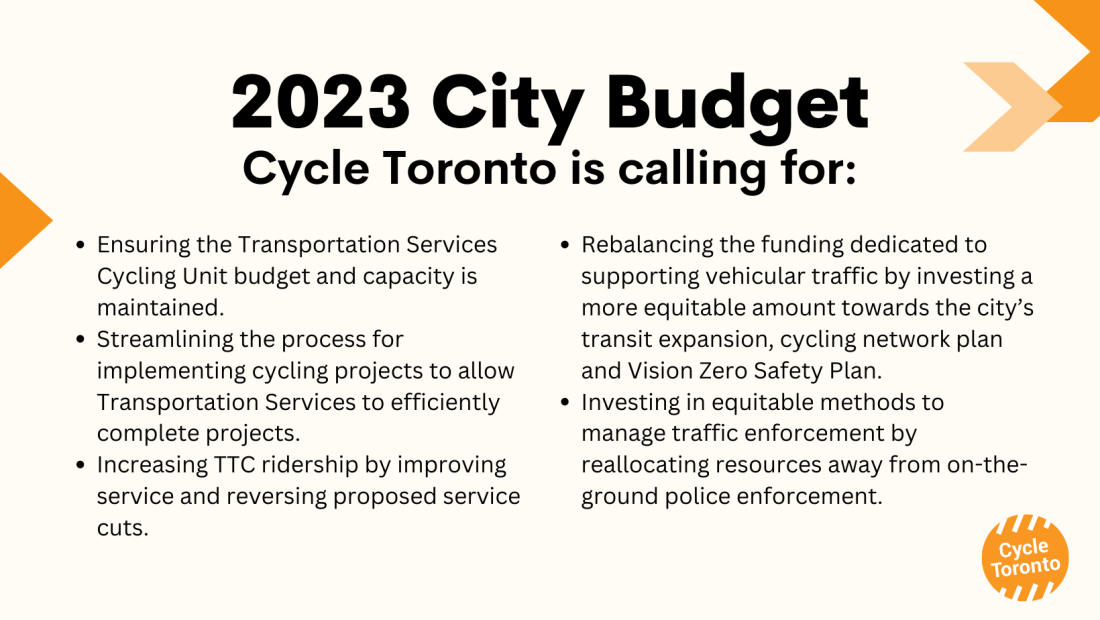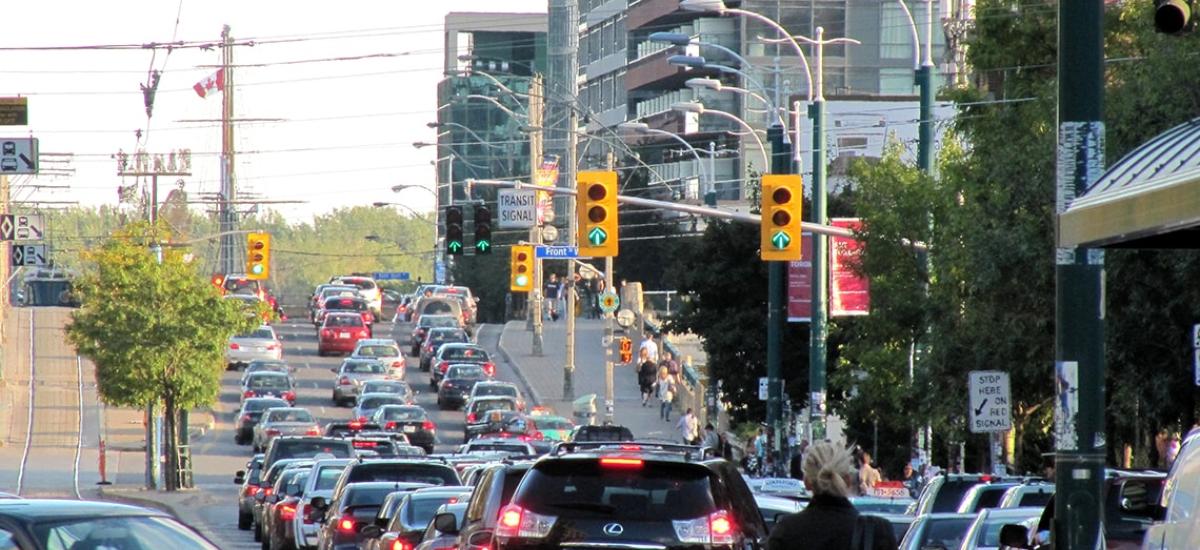
2023 City Budget: What We're Calling For

Cycle Toronto is committed to helping the city meet its ambitious TransformTO’s target of moving 75% of all trips under 5 km by active modes of transportation such as public transit, walking and biking by 2030. In order to achieve this, it is imperative that Torontonians have equitable access to convenient, connected, and affordable public and active transportation options. Doing so will ensure the city’s COVID recovery prioritizes and supports those most in need, such as shift workers, women, and low-income and racialized people.
Email Mayor Tory and the Budget Committee to Support our Asks
Biking represents an important part of Toronto’s multi-modal transportation network, but we understand that riding a bike is not feasible for every resident of Toronto. The combination of cycling and transit is integral to bridging gaps in access to the transportation network while reducing the reliance on single occupancy car trips, alleviating traffic congestion and reducing collisions. This will make our streets and roads safer for all.
We are calling for a budget that prioritizes interconnected equitable and sustainable solutions that allow Torontonians to travel safely, efficiently and affordably by:
- Ensuring the Transportation Services Cycling Unit budget and capacity is maintained to ensure the delivery of the 2022-2024 Near-Term Implementation Program. The program proposes approximately 100 centreline kilometers of new bikeways as well as upgrades to existing routes and studies for future implementation. Of particular concern is the Anticipated Unfunded Capital projects totalling $11.1 billion (page 26 of Deputy Manager, Infrastructure and Development budget presentation) which includes unspecified cycling infrastructure, YongeTOmorrow, and RE-Imagining Yonge, among other projects.
- Streamlining the process for implementing cycling projects to allow Transportation Services to efficiently implement its plans. The current approval process involves seeking Council approval for the overall plan as well as the near-term rolling plans, and each individual project. This is an unnecessarily and overly burdensome process that is a barrier to advancing projects. While community and stakeholder consultation must continue to be a key part of any project, we are asking that new projects are able to be approved and implemented in a more efficient manner to allow Transportation Services to ensure they are able to complete the Council approved 2022–2024 Near-Term Implementation Program.
- Increasing TTC ridership by:
- Improving TTC service and reversing the proposed service cuts.
- Increasing city funding for the TTC through revenue tools that don’t rely on increasing user fares.
- Investing in supportive staff who are trained to de-escalate crisis situations, not more policing.
- Funding the Fair Pass program in its entirety and lowering fares for all.
- Accelerating the RapidTO bus and streetcar priority program including high volume routes already identified like Jane Street, Dufferin Street, Steeles Avenue West, Finch Avenue East, and shuttle bus routes in place of Line 3 Scarborough which is scheduled to close this year.
- Rebalancing the funding dedicated to supporting vehicular traffic by investing in a more equitable amount towards the city’s transit expansion, cycling network plan and Vision Zero Safety Plan. Recognizing that not all investment in transit projects is reflected in the budget presented by Deputy Manager, Infrastructure and Development, the amount of money going towards the 10-Year Gross Capital Program for roads, bridges, and state of good repair ($4 billion) is more than double the combined amount for transit expansion, the Cycling Network Plan and the Vision Zero Road Safety Plan ($1.861 billion). If the city is serious about its commitments to its climate action targets and Vision Zero goals of eliminating road violence, more investment must be made into the programs and initiatives that will help the city achieve them.
- Investing in equitable methods to manage traffic enforcement by reallocating resources away from on-the-ground police enforcement. The most effective solution to improving road safety is to build streets that are safe by design, not by relying on police enforcement. The Toronto Police Service has acknowledged they have engaged in discriminatory practices toward Black, Indigenous, and other racialized communities and “in particular that Black communities are disproportionately subject to use of force and other enforcement actions”. The safety of some road users should not come at the expense of the safety of others. As Cycle Toronto discussed with Mayor Tory last summer to help diffuse tensions around High Park, we urge Council to focus on evidence-based policy and design solutions that will better address the underlying causes of road violence in our city. It has been proven that community-led traffic management and Vision Zero design elements city-wide such as maintained sidewalks, protected bikeways, Complete Streets, Automated Speed Enforcement and Red Light Cameras should take priority ahead of police enforcement.
We all want to live and thrive in a city that is safe, healthy, and economically vibrant. With a mission to make cycling a viable option for all Torontonians, Cycle Toronto shares the city’s goal of having a transportation network that supports vibrant communities by connecting residents and businesses to accessible, resilient and reliable active transportation options. We also recognize that giving people these options is essential to meeting our climate action goals. Additionally, and most importantly, Cycle Toronto would like to see the city meet its strategic goal of ensuring that all Torontonians have equitable access to City services, especially for Indigenous, Black and equity-seeking groups.
The way the City allocates funds is a direct reflection of what and who it prioritizes, and we urge you to reconsider how you are allocating funding towards supporting Toronto’s multi-modal future that hinges on connecting people to efficient, affordable and safe options to get around.
View the Infrastructure and Development Budget Presentation
Banner image courtesy of University of Toronto
Sample Email to Mayor and Budget Committee:
|
|
|
|
|
|
|
|
|
|
|
|
